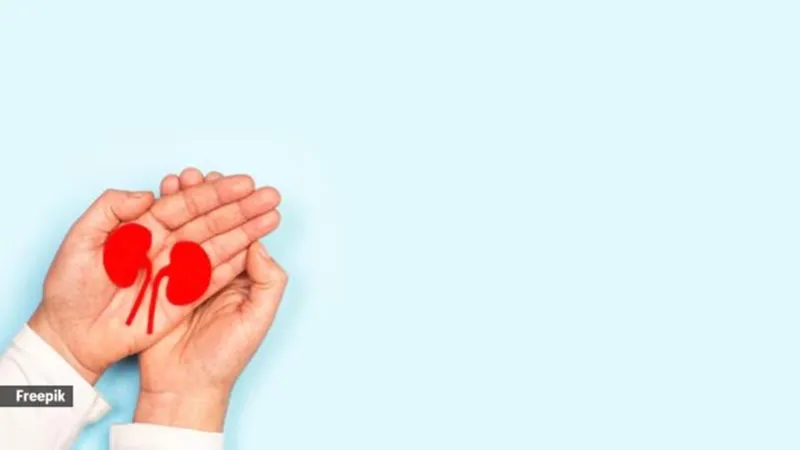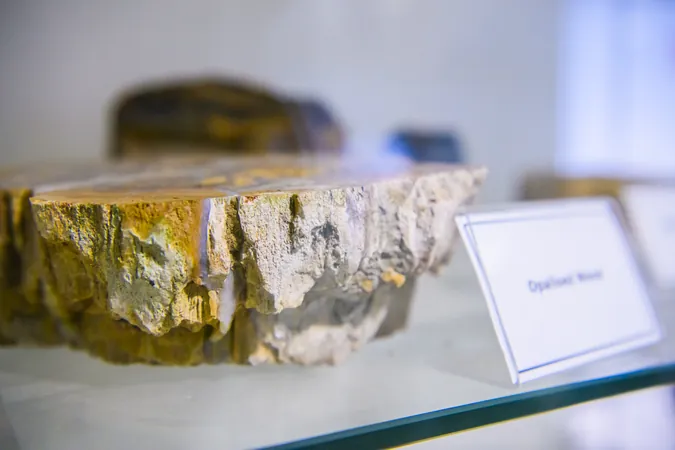
Unlock the Secrets to Kidney Health: Why Early Detection of Chronic Kidney Disease is a Game Changer!
2025-03-30
Author: Jia
Chronic kidney disease (CKD) is more common than many realize, and its consequences can be devastating. When kidneys fail to filter waste from the blood, the resulting health crises can lead to intensive treatments that severely impact an individual’s quality of life. The alarming reality is that many people remain undiagnosed until it's too late, with far-reaching implications for their health and well-being.
Understanding the Role of Your Kidneys
Your kidneys are vital organs with several critical functions beyond mere waste filtration. They maintain your body's fluid balance, regulate blood pressure, control electrolytes, and promote the production of red blood cells. However, various factors—from severe dehydration to chronic conditions like high blood pressure and diabetes—can lead to kidney damage over time. This damage can silently progress, ultimately culminating in kidney failure, before symptoms manifest.
When kidneys reach a state of failure, they cease urine production, leading to fluid buildup and dangerous electrolyte imbalances. Patients often find themselves facing a choice between dialysis—a demanding and time-consuming process—or the hope of a kidney transplant, which can take years to secure.
Why Early Detection is Key
The primary culprits behind CKD in the United States are conditions like high blood pressure and diabetes. Alarmingly, up to 40% of diabetics and 30% of those with high blood pressure may develop CKD. Unfortunately, many individuals in the early stages of the disease experience no noticeable symptoms. This is where proactive health management becomes crucial: routine testing of kidney function—using the estimated glomerular filtration rate—is recommended, especially for those at risk.
Emerging treatments, like SGLT2 inhibitors, not only manage blood sugar but also promise direct kidney protection—offering hope that early intervention can prevent the progression to more severe disease.
Barriers to Diagnosis and Care
Despite the clear benefits of early detection, barriers remain. Many patients, particularly those from minority backgrounds or lower socioeconomic environments, find themselves overlooked in clinical settings. Research indicates that as many as one-third of individuals with kidney failure had no prior documented treatment for kidney issues during the critical early stages. Shockingly, just 10% of those diagnosed are aware of their condition.
The limitations of the current healthcare system, including rushed primary care visits influenced by insurance policies, often push CKD discussions to the back burner. This leads to late-stage diagnoses, when potential treatments become significantly more complicated and less effective.
Taking Control of Your Kidney Health
Empowering individuals to take charge of their health can make a significant difference. Those at risk for CKD should actively engage with their healthcare providers and ask critical questions about kidney health—such as "What is my kidney function?", "Am I at risk for chronic kidney disease?", and "What steps can I take today to protect my kidneys?" Initiatives are underway to develop digital tools that can visually represent kidney health metrics, facilitating informed discussions during doctor visits.
Studies reveal that patients with a documented CKD diagnosis often receive more comprehensive care aligned with treatment recommendations, leading to improved outcomes. People who have witnessed the health struggles associated with dialysis often exhibit increased motivation to adhere to treatment protocols and lifestyle changes aimed at reducing their risk.
Don’t Wait! Your Kidney Health Is in Your Hands
For those navigating the landscape of chronic kidney disease—whether already diagnosed or at risk—taking proactive steps is essential. Leading a healthy lifestyle, maintaining regular medical check-ups, and advocating for oneself within the health care system can dramatically alter your longevity and quality of life. The fight against kidney disease starts with you—don't hesitate to seek the knowledge and resources to safeguard your kidney health.


 Brasil (PT)
Brasil (PT)
 Canada (EN)
Canada (EN)
 Chile (ES)
Chile (ES)
 Česko (CS)
Česko (CS)
 대한민국 (KO)
대한민국 (KO)
 España (ES)
España (ES)
 France (FR)
France (FR)
 Hong Kong (EN)
Hong Kong (EN)
 Italia (IT)
Italia (IT)
 日本 (JA)
日本 (JA)
 Magyarország (HU)
Magyarország (HU)
 Norge (NO)
Norge (NO)
 Polska (PL)
Polska (PL)
 Schweiz (DE)
Schweiz (DE)
 Singapore (EN)
Singapore (EN)
 Sverige (SV)
Sverige (SV)
 Suomi (FI)
Suomi (FI)
 Türkiye (TR)
Türkiye (TR)
 الإمارات العربية المتحدة (AR)
الإمارات العربية المتحدة (AR)